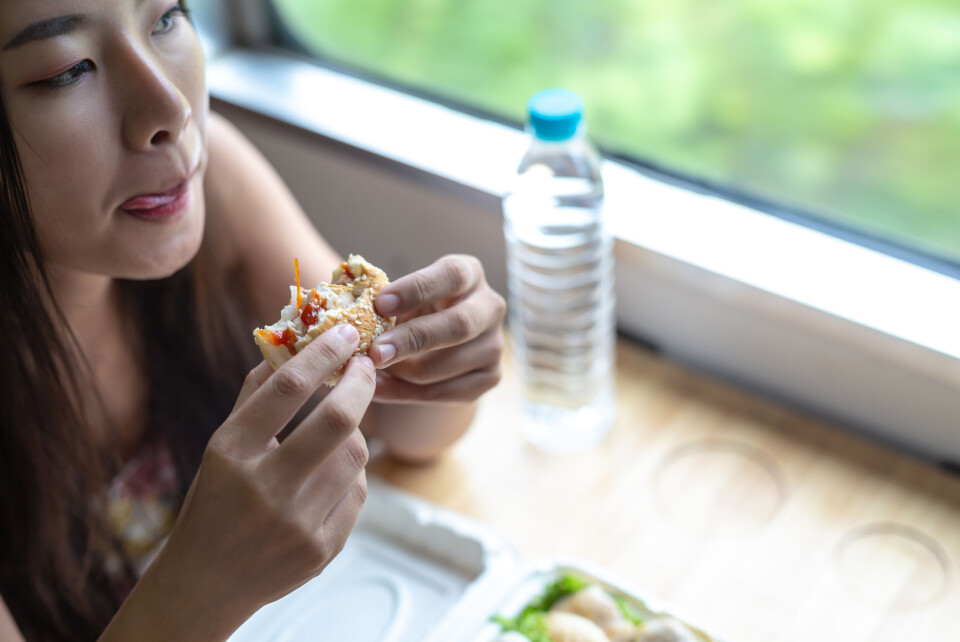-
Phone-at-wheel crackdown on drivers in south-west France
Immediate licence suspensions introduced for offence in three departments
-
Mysterious boom rattles residents in south-west France
'The shockwave clearly went sightseeing across the countryside', says local
-
France tightens reimbursement rules for flight delays or cancellations
New measures include mandatory mediation and new claim procedures
Planes, buses, trains: France’s Covid rules for eating and drinking
We explain where and how you are now allowed to eat or drink when taking public transport

Eating and drinking on public transport in France – including on trains and planes, as well as on the metro and buses – is to be drastically reduced but not banned completely in all cases, new rules state.
A government decree, introduced yesterday (Monday, January 3), does not formally ban eating and drinking on public transport, but it does make it more difficult.
Previously, passengers were permitted to remove their masks when eating or drinking, and the cafe carriages of long-distance trains were generally open.
Now, cafe and bar carriages on long-distance trains will not be allowed to serve food or drink, and passengers must only remove their masks very briefly to take a bite or a quick drink, before replacing their masks immediately.
Transport Minister Jean-Baptiste Djebbari told BFMTV: “If you have an urgent need to eat and drink because you are fragile or because you simply have that physical need, you can take off your mask and drink or eat quickly, and put it back on immediately afterwards.
“What we’re trying to avoid – which is rare but does happen – someone who takes off their mask to eat crisps for several minutes, or even several hours. It’s this kind of abuse [of the rules] that we’re looking to avoid.”
The new rules include:
Sale of food and drink banned
Until January 23 at least, all onboard sales of food and drink are not allowed during journeys in mainland France. Food and drink carriages on TGVs will be closed and no food or drink will be served on domestic flights.
Limits on consumption depending on health rules
The question of whether eating and drinking is allowed on public transport has been debated over recent days.
On December 27, Prime Minister Jean Castex said: “The consumption of drinks and food will be banned on public transport, including long-distance.”
And yet, the official decree published on December 31 does not specify exact rules for transport. It only states that “the sale and service” of food and drink are banned on public transport.
In contrast, it states clearly that “the consumption of food and drink” is explicitly banned in sports halls, cinemas and theatres.
This means that technically, the consumption of food and drink is not formally banned on public transport, but that, in keeping with the rules on wearing masks, it is advised to only remove your mask very quickly, and only if you really need to eat and drink.
Transport companies must keep passengers up to date with the latest health rules, the government has said.
Trains
Food and drink rules applied “with discretion”. The general rule still states that taking off your mask to eat and drink is banned, except for Thalys and Eurostar services.
However, a spokesperson for the ministry of transport said: “On long-distance journeys, this measure will be applied with discretion, especially for young children, and when needed for refreshment.”
Local city transport
Removing your mask to eat and drink is banned, although enforcing the rule may be difficult. Ile-de-France transport provider RATP has said it will train its 1,000 staff to manage the issue.
Planes
The sale, service, and consumption of food and drink are banned for domestic flights within France. The exception is flights to overseas French territories. For these flights, meals will continue to be served.
Long-distance coaches
The ban applies.
Yet, Vincent Hays, business director of company Flixbus, told LCI: “When the driver is driving, it’s difficult to check up on each passenger.”
However, he added that drivers should let passengers know that they will be stopping around every two hours for a break, during which there should be enough time for food if need be.
Masks required for children 6 and over on public transport
From yesterday (January 3), children aged 6 and over have been required to wear a mask on all public transport and in indoor public spaces. This includes all trains, boats, planes, taxis and hired vehicles, stations, and airports. This rule will apply at least until January, 23.
Previously, the rule only applied to people aged 11 or over.
Related articles
Recap: The seven key Covid rule changes that start in France today
Coronavirus: Daily updates on the situation in France
New government measures: Where are masks now obligatory in France?
























